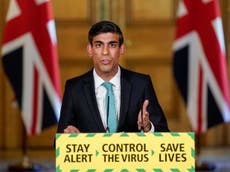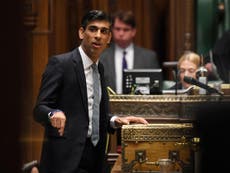UK unemployment: 650,000 fewer people on UK payrolls as coronavirus pandemic continues
Hours worked fall at record rate while job vacancies disappear as nation prepares for unemployment to hit 4 million this year

The number of paid employees in the UK fell by 649,000 between March and June, while job vacancies disappeared, official figures show.
Early estimates showed the number of people on employers’ payrolls fell by 1.9 per cent compared with a year ago, the Office for National Statistics (ONS) said.
Unemployment fell by 17,000 between March and May to 1.35 million, leaving the official rate unchanged at 3.9 per cent.
However, experts warned that the jobs figures masked the true scale of the crisis. The number of hours worked dropped at the fastest pace on record, suggesting that the headline unemployment is an underestimate.
Average weekly hours worked per person fell to a record low of 26.6 between March and May, down by 5.5 hours on the same period a year ago. Weekly data shows that hours worked began to recover in May, with self-employed people seeing a significant rise in work.
Job vacancies fell to 333,000 between April and June – almost two-thirds lower than in the same period last year and the lowest level since the ONS began collecting comparable data in 2001.
The claimant count, which includes people on universal credit or jobseeker’s allowance, more than doubled between March and May to 1.4 million, before levelling off in June.
Jonathan Athow, deputy national statistician at the ONS, said: “As the pandemic took hold, the labour market weakened markedly, but that rate of decline slowed into June, though this is before recent reports of job losses.
“There are now almost two-thirds of a million fewer employees on the payroll than before the lockdown, according to the latest tax data.
“The Labour Force Survey is showing only a small fall in employment, but shows a large number of people who report working no hours and getting no pay.”
He added: “There are now far more out-of-work people who are not looking for a job than before the pandemic.”
Economists forecast that unemployment will rise sharply, to as much as 4 million by the end of this year, as the government’s job retention scheme comes to an end.
Some 9.4 million people have been furloughed since the pandemic began, with their wages covered by the state, but employers must start to contribute from 1 August and the scheme ends on 31 October.
The latest ONS figures suggest millions of furloughed employees have already gone back to work. The number of people temporarily away from work dropped from a peak of 8.8 million in April to 6.3 million by the end of May.
That figure is likely to have continued to fall as non-essential retailers, pubs and restaurants – all big employers – began to reopen in June.
However, almost a third of businesses plan to cut staff in the next three months, according to a survey this week by the British Chambers of Commerce found.
Government plans to slow the expected surge in joblessness have attracted criticism, with the Institute for Fiscal Studies labelling them “badly timed and poorly targeted”.
Last week Rishi Sunak announced subsidies for restaurant meals, a VAT cut for hospitality firms and a £1,000 bonus for each furloughed employee brought back into work and kept on until January.
The chancellor has conceded that much of the furlough bonus was “dead weight”, meaning it would be wasted on paying employers for workers they had intended to keep on anyway.
John Phillips, GMB acting general secretary, said: “Without further government action, the risk is the cuts to jobs and wages so far will just be the tip of an iceberg that crushes livelihoods and crashes our economy.
“The response from this recession cannot be like the last if we are to recover.
“This country cannot endure another decade of weak growth and cuts to services – we need a government prepared to make bold investment in jobs, skills and industries.“
Alok Sharma, the business secretary, said many people are facing a “very, very difficult” time, following the publication of the latest unemployment figures.
“I think the best thing we can do is continue to open up the economy in a phased manner, a cautious manner, and get businesses up and running again,” he told BBC Radio 4’s Today programme.
Mims Davies, the minister for employment, said: “We know that people are worried about their livelihoods, which is why we’ve put in place a plan for jobs.
“A crucial part of that is doubling the number of frontline work coaches so that every jobseeker gets support to find work as well as launching the Kickstart scheme to create hundreds of thousands of new, fully subsidised jobs for young people across the country.”
Subscribe to Independent Premium to bookmark this article
Want to bookmark your favourite articles and stories to read or reference later? Start your Independent Premium subscription today.






Join our commenting forum
Join thought-provoking conversations, follow other Independent readers and see their replies
Comments